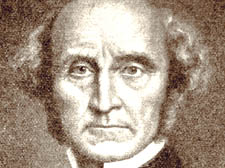|
|
 |
| |

JS Mill’s powerful literature was a profound influence of Victorian Britain |
A writer who shaped the modern world
As Victorian Britain came to terms with the social fallout of the Industrial Revolution, JS Mill put forward a new framework for liberal living, writes John Mills
BY any standards, John Stuart Mill was a major figure in Victorian Britain and a significant influence on the development of world intellectual opinion.
Starting from a background of undiluted Utilitarianism – Jeremy Bentham’s principle that the greatest happiness for the greatest number would provide sure moral guidance – his thinking and writing broadened out into a much more comprehensive and considered view of the world and the key issues which industrialisation and rising living standards were calling into play.
He wrote prodigiously – books which are still classics as well as countless articles for magazines such as the Westminster Review for whose editorial content he was for a long time largely responsible.
Nor was JS Mill just a literary figure. He was also an active campaigner for the many causes he espoused and a Liberal Member of Parliament, albeit for a relatively short period from 1865 to 1868 although this was not a particularly happy or effective experience for him. He was always much more effective as a writer than as a politician.
Mill was educated precociously by his father, James Mill. Richard Reeve’s book provides a comprehensive and detailed account of the evolution of John Stuart Mill’s thinking. Although always inclined to radical and progressive views, Mill was also influenced by conservative thinkers such as Coleridge as well as by his familiarity with France and with French political thought, producing a synthesis of ideas which led to the richness of his literary output.
A period of depression during his early twenties, partly in reaction to the severity of his upbringing, also helped him to be more tolerant and open-minded than he might otherwise have been.
Never a particularly impressive public speaker, Mill’s exceptional talent lay in his capacity for clear, concise, and extremely well-informed literary output. His Principles of Political Economy quickly became the standard textbook on economics. A System of Logic, published a little earlier, had a significant influence on philosophy.
Utilitarianism, one of his later works, was a much more complex and subtle interpretation of the concepts developed earlier by his father and Jeremy Bentham. Perhaps more influential still, however, was On Liberty, which has stood the test of time as one of the most compelling and persuasive texts on personal freedom ever written. At heart, liberty was more important to JS Mill than anything else.
Many other issues drew Mill’s campaigning attention, however, over the long period in which he was actively involved in mid-Victorian politics.
He was heavily influenced by Harriet Taylor who, after a longstanding relationship with him, eventually married him when her husband died.
Mill was strongly in favour of women’s rights long before it became fashionable to take up this particular cause. Sadly, their marriage lasted only seven years before his adored wife died.
During all this period, he campaigned against slavery and in favour of the North American States against the South. He castigated the British government’s handling of Ireland, especially during the potato famine.
Well aware of the downsides as well as the upsides of the industrial revolution taking place all round him, he favoured common ownership while remaining concerned about the infringements of liberty entailed in Parliamentary regulation of working conditions.
He was in favour of extending the right to vote, although with some caution as to what its results might be if not surrounded by safeguards, particularly adequate education for those to be enfranchised.
When Mill died in Avignon in 1873, to be interred alongside his wife who had been buried there 15 years earlier, Victorian England lost a hugely important and influential figure.
During his lifetime, Mill had a major impact on the way in which Britain coped with the crucial impact of the huge changes in living standards, population size, opportunities and disadvantages which the Industrial Revolution entailed.
It was his writing, particularly on economics and liberty, which provided much of the framework of ideas which enabled Britain to emerge with the liberal democratic institutions and practices which have become a model for much of the rest of the world.
Richard Reeves’s biography describes in carefully chosen detail how JS Mill managed to accomplish so much.
|
 |
|
 |
 |
|
 |
|


